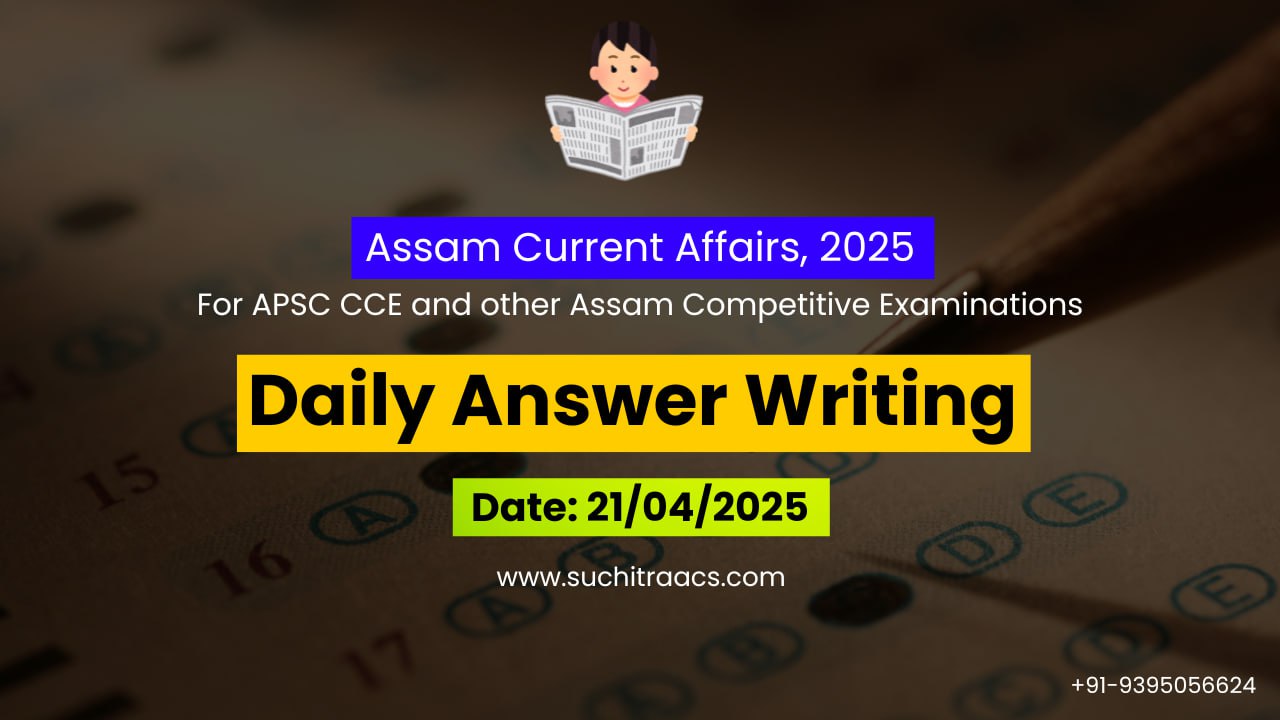APSC Answer Writing (Daily) based on Assam Tribune – 21/4/2025
For APSC CCE and other Assam Competitive examinations aspirants, practicing Daily Answer Writing is vital. This blog covers the most important Main question and its model Answer from the Assam Tribune today (21-04-2025).
📝 Mains Question (GS Paper 3 – Internal Security | Technology | Governance)
Q.
“Cyberwarfare is no longer science fiction — it is a real and immediate threat to national security.”
In the context of recent cyberattacks on critical infrastructure, examine the preparedness of India’s cyber defence architecture. Suggest a holistic strategy for strengthening India’s digital sovereignty.
✅ Model Answer
🔹 Introduction
Cyberwarfare has rapidly evolved into a frontline national security threat. India — home to the world’s largest digital public infrastructure (UPI, Aadhaar, Digital India) — faces increasing risks from state-sponsored cyberattacks, ransomware, data theft, and espionage. Recent incidents like the AIIMS ransomware attack, alleged Chinese grid hacking (2020), and attacks on defence R&D facilities reveal glaring gaps in preparedness.
🔹 Why Cybersecurity Is Crucial for India
| Sector | Impact of Breach |
| Critical Infrastructure | Power grids, telecom, banking — can paralyze the economy |
| Defence & Space | Espionage on DRDO/ISRO weakens strategic autonomy |
| Health & Data | Leaks from Aadhaar/health data erode trust and citizen safety |
| Digital Economy | UPI, digital rupee vulnerable to manipulation |
| Diplomatic Fallout | Attribution of attacks may strain international relations |
🔹 Current Preparedness Framework in India
| Institution | Role |
| CERT-In | Monitors and responds to civilian cyber threats |
| NCIIPC | Protects critical information infrastructure (e.g., power, banking) |
| Defence Cyber Agency (DCA) | Handles cyber defence and offence for military |
| National Cyber Coordination Centre (NCCC) | Inter-agency threat intelligence |
| I4C & Cyber Crime Portals | Civil police response to cyber fraud and harassment |
🔹 Key Gaps in India’s Cyber Defence
| Gap | Explanation |
| No Dedicated Cybersecurity Law | The IT Act 2000 is outdated for modern AI/quantum threats |
| Siloed Architecture | Civil and defence cyber units often lack coordination |
| Human Capital Deficit | Over 2 million cybersecurity professionals needed by 2027 |
| Dependence on Foreign Tech | OS, chips, and routers largely imported — potential backdoors |
| Low Cyber Awareness | Government departments and small businesses lack basic hygiene |
🔹 Global Best Practices India Can Adopt
- Zero Trust Architecture (US): Authenticate every user, every time
- Cyber Command Integration (Israel): Merged military-civil cyber command
- Critical Infra Simulations (Singapore): AI-powered real-time breach drills
- Digital Sovereignty Investments (France): Promoting local cloud and chip industry
🔹 Way Forward: A Holistic Cybersecurity Strategy
1. Legislative Reform
- Enact a National Cybersecurity Law with clear breach protocols, penalties, and grievance redressal.
- Update Data Protection Act to reflect evolving threats from AI and quantum computing.
2. Institutional Synergy
- Merge civilian and military frameworks into a Unified Cyber Command under NSCS (National Security Council Secretariat).
- Create District Cyber Cells with trained staff and dedicated budget.
3. Skilling and Capacity Building
- Launch a National Cyber Talent Mission under Skill India and AICTE.
- Offer scholarships, cyber bootcamps, and coding-for-security modules in universities.
4. Promote Indigenous Tech Ecosystem
- Incentivize home-grown OS (like Bharat OS), cloud servers, and firewall software.
- Support MSMEs in securing digital supply chains.
5. Public Awareness and Hygiene
- Mandatory cyber audits for all public offices.
- Introduce Cyber Hygiene Curriculum at school and college levels.
6. International Cyber Diplomacy
- Advocate norms of cyberspace conduct under UN frameworks.
- Join and lead global coalitions like the Paris Call for Trust in Cyberspace.
🔹 Conclusion
India stands at a crossroads where its digital power must be matched by digital defence. Cyberwarfare is not a distant threat—it is happening now, silently and swiftly. To secure its sovereignty, economy, and citizen rights, India must adopt a multi-layered, tech-enabled, and legally sound cyber strategy. The time to act is not tomorrow—it is now.
✨ Looking for top-quality APSC Mains Guidance with Personalised Mentor?

🔔 Join Our WhatsApp Study Group!
For exclusive access to premium quality content, including study materials, current affairs, MCQs, and model answers for APSC CCE and other Assam competitive exams.
Click here to join: SuchitraACS Study WhatsApp Group
📚 Want to know more about SuchitraACS’s most affordable courses?
Click here to know more: SuchitraACS Courses for APSC CCE and Assam Competitive Examinations




